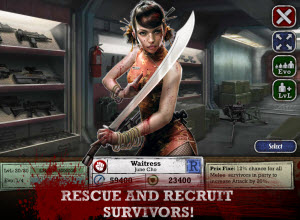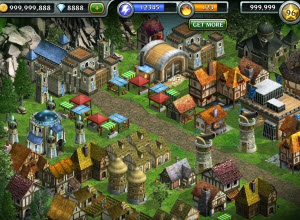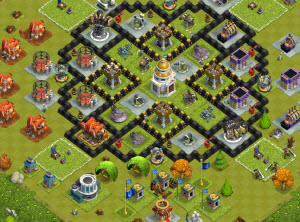Japan’s Gree had both an inspiring and difficult week in mobile games. The company’s U.S. division, Gree International, showed off four new games that reflect the company’s shift toward fewer, higher quality titles. These include the zombie game Beyond the Dead; the modern military strategy game Call To Arms (A Clash of Clans clone); the fantasy role-playing game Dragon Realms; and the social casino game Jackpot Bingo.
At the same time, the parent company said it was offering buyouts to as many as 200 of its employees. That was on top of cuts earlier in the summer as the reality of the company’s expansion into the West is taking shape.
We caught up with Anil Dharni, chief operating officer at Gree International, to talk about latest games and the changes in the mobile game business. Here’s a transcript of our interview with Dharni.
GamesBeat: How much work does this represent? Is this your fall lineup, so to speak?
Anil Dharni: This is about six months – six to eight months, depending on the game – worth of effort. We also launched two games before this, earlier this year. We launched War of Nations, which is our first hardcore game. It’s top 25 grossing on iOS. And we launched Jackpot Slots, which is a top 15 grossing game on Android.
GamesBeat: Any particular interesting changes in the market since we talked this summer?
Dharni: Where to start? On the marketing side, Facebook has become a huge force in terms of user acquisition. The analytics tools, the data, are getting better over time. We see certain players there doing well. I think those startups are going to end up doing well. On the game genre side, I feel like this is the first quarter where we’ve not had a surprise. We haven’t seen a Candy break out, or a Clash of Clans. The market has settled a bit right now. We’ll see how the next quarter is.
People like us are getting better at ensuring that every game we launch gets into the top 15 or the top 25. At least from Gree’s side, what I’m very proud of in this studio is that every game we launch hits that goal. We put significant marketing budgets in, but we’re able to sustain it and keep it. We don’t lose users.
What you can see here is that we’ve done really well at mid-core. We’ve proven out in hardcore with War of Nations. We’ve proven out now in casino. The casino is going to have a second game. We’ve been able to scale across genres. I don’t find that example in too many other companies.
GamesBeat: Is Beyond the Dead the first game from your Canadian studio?
Dharni: This will be their first one, yeah. In the next four weeks or so they’ll be ready to roll.
GamesBeat: If it was a year or two years ago, there would be maybe a dozen games coming out instead. There’s less of that happening now, it seems like.
Dharni: At least from our perspective, we were never very excited about that strategy. We never believed in releasing 20 games a year, or even 12 games a year. At Funzio, I still remember “get acquired, or sell, or raise money.” And when you tried to raise money, the VCs would say, “What, you only want to release four games next year?” Yeah, that’s what we’re going to do. But we’ll make sure every game’s a success.
I think you see that represented here. We’re 400 people. We’ll do about six games this year. But we’re ensuring that we can make each one a 100 percent success.
GamesBeat: The size of the market seems to be growing, even though some players seem to be dominating the top ranks. There’s a healthy market under them, in contrast to something like the core console market, where Grand Theft Auto is selling and nothing else is.
Dharni: Absolutely. We keep seeing that. In 2011 a game would do one million a month and that was awesome. Now it’s moved much further than that. What it takes to get to top 10 or top 15 grossing is orders of magnitude higher than what it was in 2011, or even in 2012. That’s good news, because all the boats are rising. It’s the ones that are consistent in breaking the same old genres and having a different angle, a different flavor in that genre, that are going to do well.
GamesBeat: Are you getting excited about different ways of monetizing? Is advertising starting to fulfill what it’s supposed to do?
Dharni: For us, we’re IAP-driven. We’re not big fans of advertising-driven models, at least for the free-to-play multiplayer games we focus on. We still feel like the ad model hasn’t been tuned enough such that the ad product is there, but it doesn’t break the experience for the user. We’re not yet bullish on that model. Over 90 percent, 95 percent of our revenue is driven by in-app purchases.
GamesBeat: Some of those guys have been modifying what the ad really is, so it’s a bit more in-game. A lot more can be created by the developer themselves. It’s more about showing the player what they’re interested in. There’s a bit more sophistication than what originally was on top of those kinds of apps.
Dharni: I would be totally excited with that model, as long as that’s where the ad products go – more engaging, more relevant, it doesn’t ruin the experience. But we haven’t yet seen anything that’s convinced us to move to that model.
GamesBeat: User-acquisition costs are still pretty high. I don’t know if that’s a concern or if it’s just part of doing business now.
Dharni: For us, the trend—We have a very data-driven marketing team. We look at our effective cost per install, and we’re not seeing a trend – at least for us – where it’s rising at an alarming pace or even at a significant pace. We can now predict, with a very high level of accuracy, what we’re going to get.
One of the reasons is Facebook. Ever since Facebook moved into mobile user acquisition, it’s helped us target users better and acquire them at a price we couldn’t get with other ad methods. That’s been a welcome addition.
I’m looking forward to Twitter making a play here. I’m looking forward to YouTube potentially making a play here. A lot of people watch videos on mobile. As those two other channels mature, we’re going to see user acquisition become more data-driven, and it’ll keep down the effective cost of user acquisition. We’re excited about those changes.
GamesBeat: There doesn’t seem to be as many companies being bought right now. That’s created a different environment from what was happening a year or two ago. You guys haven’t bought as many. EA’s stopped buying ever since they got their new CEO in. Zynga, too.
Dharni: Yeah. The bigger players are going through management reshuffling and some other growing pains, whether it’s shifting platforms or trying to find a CEO. People have some challenges. The other thing is, the companies that are doing extremely well are in a different orbit, but there’s enough of a band of companies that are generating healthy revenues and profits, but don’t really have a direction. These are companies where I don’t really know where they’re going. Some of the technologies and the genres they’ve invested in, people have moved away from them. They’re in a sort of limbo. They don’t know what their next chapter will be. It’s a tough situation, but they’re not very attractive to buyers, because even though they’re spinning a lot of revenues, they’re in old genres and old engines.
GamesBeat: It seems like there are more Asian companies that could come in and change things again.
Dharni: What’s been fascinating this year is seeing more of the globalization of games, in a sense. Everyone had this assumption that we needed to set up a local studio in whatever place – Japan, Korea, here – and then customize the game, take the existing engine and translate it. What we’re seeing now with some of these games is that customization is not important. Getting the localization right is extremely important. It’s probably the most important thing. There’s a democratization of these genres, focusing on the localization aspect, but not on the customization. There’s no need to change characters. Keep them just the same and people will adopt them, associate themselves with them.
That’s an interesting trend. I want to see some more data points in that space. We’re going to make some plays there. I’m excited about that.
VentureBeat's mission is to be a digital town square for technical decision-makers to gain knowledge about transformative enterprise technology and transact. Learn More





